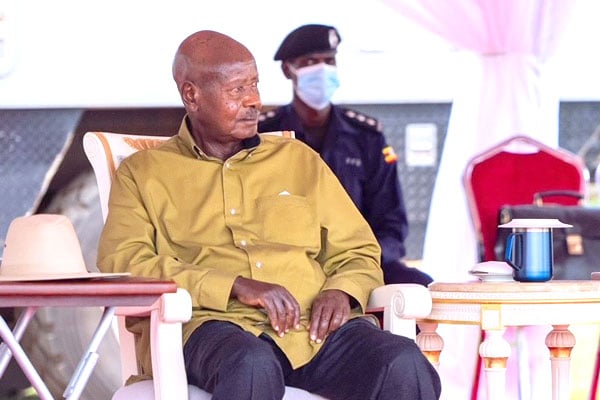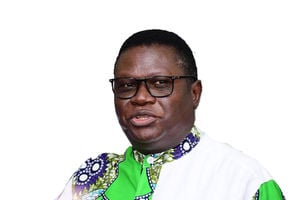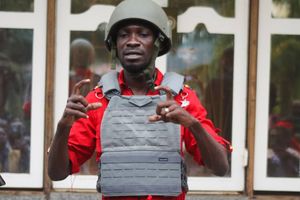
President Museveni
A clip of part of the speech that President Museveni gave at the close of the first defence expo, which was organised in memory of the former minister for Internal Affairs and army commander, Gen Aronda Nyakairima, has been doing the rounds on social media.
The biggest talking point has been Mr Museveni’s claim that the Opposition National Unity Platform (NUP) party’s strong showing in 2021 was due to rigging.
“I have now got all the evidence that in the last election, NUP cheated by one million votes. I have the facts. NUP can take me to court and they say Museveni has falsely accused them, but this is what happened. One million votes!” Mr Museveni said.
NUP’s presidential candidate, Mr Robert Kyagulanyi Ssentamu, came second with 3,631,437 votes, representing 35.08 percent of the vote in a poll in which candidate Museveni of the ruling National Resistance Movement (NRM) was declared the winner with 6,042,898 votes, which represented 58.38 percent of the 10,744,319 votes cast.
Mr Museveni would by his assertion want us to believe that Mr Kyagulanyi’s actual vote was 2,631,347 and not what the Electoral Commission (EC) declared.
Mr Museveni’s comments at the expo drew mixed reactions. Whereas there was a section that clapped and applauded, a sizable section laughed in disbelief. Sections of the public also received his claims with disbelief.
The President could also not help, but chuckle a bit soon after making his comments. It is now difficult to tell whether he is serious about his claims, but Mr Livingstone Sewanyana, the executive director of the Foundation for Human Rights Initiative (FHRI), thinks that the President did so in jest.
“Of course, that is comedy on his part. He sometimes likes to act like a comedian,” he says.
One does not need to scratch their head too hard to understand why his comments are being received with a pinch of salt. Mr Museveni is not your run-of-the-mill politician. He is the President, commander-in-chief of the armed forces, national chairman of the ruling NRM and appointer of the chairperson and officials of the EC.
Serious remarks
It would in the circumstances be inconceivable that Mr Museveni is making such claims, but Dr Chris Baryomunsi, the minister for Information and Communications Technology (ICT) and National Guidance insists that the President’s claims should be taken seriously.
“By the time the President makes a public statement, he is sure of what he is talking about. He was commenting on a weakness he has observed in the electoral system which resulted in his votes being rigged,” Dr Baryomunsi says.
Misinformation
If what Dr Baryomunsi said is anything to go by, Mr Museveni was dead serious.
Mr Joel Ssenyonyi, the Leader of the Opposition in Parliament (LoP) argues that if Mr Museveni was serious, that seriousness could only have been the product of wrong information. Mr Museveni’s handlers, he said, had to find a way of explaining NUP’s strong showing in the 2021 elections.
“There are people around him who keep taking advantage of his situation and age. They know how we performed. So I am sure he asked for an explanation to that effect and maybe that is the explanation that they gave him because they are the ones in charge… It is just like when he sees all the support we get wherever we go and then they tell him, ‘Those guys are supported by homosexuals’. So they give him some kind of explanation which they know will comfort him,” Mr Ssenyonyi says.
It should be remembered that NUP’s Kyagulanyi beat Mr Museveni to the central region vote with a margin of 614,677 votes. Mr Museveni garnered 838,858 votes against Mr Kyagulanyi’s 1,453,535 votes.
The NRM also lost more than 10 parliamentary seats to NUP. Mr Museveni’s vice president of 10 years, Mr Edward Kiwanuka Ssekandi, and ministers Judith Nabakooba, Vincent Bamulanzeki Ssempijja, Kezimbira Miyingo, Beti Olive Kamya, Nakiwala Kiyingi and Haruna Kasolo who were holding the ICT and National Guidance, Agriculture, Higher Education, Lands, Youth and Microfinance dockets respectively were on the casualty list.
However, Dr Baryomunsi insists that whereas the biometric machines were meant to have been used for purposes of voter verification and identification the law provided that voting could continue where machines had broken down, a loophole that the Opposition allegedly capitalised on to rig the polls, especially in parts of central region where Mr Museveni and the NRM took a heavy beating in the 2021 polls.
Who benefits?
Mr Ssenyonyi is, however, quick to dismiss Dr Baryomunsi’s conclusion. He argues that Mr Museveni’s performances at some of the polling stations in western Uganda are testimony that the NRM benefited from the technical glitches.
“You all saw the videos which kept making the rounds of military persons pre-ticking ballot papers. Were those commanded by NUP? In about 159 polling stations in western Uganda, he (Mr Museveni) scored 100 percent. How is it that everyone turned up? No one was ill. No one died. All of them turned up and all of them voted for him,” he says.
Mr Ssenyonyi said there were also polling stations where the votes cast were more than the registered voters at the polling stations and others where Mr Museveni received 99 percent of the votes. Those figures, he says, are indicative of rigging.
Wider implications
NUP has since challenged Mr Museveni to make whatever evidence he has public. Whether he will rise up to the challenge remains to be seen, but for many an actor, Mr Museveni’s comments have served to return questions about his 2021 election victory back to the discussion table. Mr Ssenyonyi thinks that Mr Museveni inadvertently conceded that the 2021 election was flawed.
“He seemed to be conceding to what we have severally said that our elections are flawed elections. Now he is coming out to say, ‘yes, they are flawed, but not in my favour. In favour of these other guys,’” Mr Ssenyonyi points out.
Prof Sabiti Makara, who teaches Political Science at Kabale University, weighs in saying an outcome cannot be deemed correct if the method or formula that was applied was wrong.
“Now that the President is amplifying it, it is reaffirming that the gadgets were not as efficient as they were meant to be. That raises the matter to another level as to how elections are organised. If you quietly know that the gadgets were faulty it means that you were producing faulty results,” Prof Makara argues.
In other words, Mr Museveni and the NRM won it ugly in 2021.
Mr Sewanyana, who has previously worked for the United Nations Human Rights Council as an independent expert on the promotion of a democratic and equitable international order, a role which entailed examining states on their democratic development practices, tells Sunday Monitor that Uganda’s democracy has been retrogressing, backing Prof Makara’s conclusion.
“Mr Museveni’s claims serve to show and demonstrate that we have never had a fair, just and inclusive election. All the elections we have had have always been disputed,” Mr Sewanyana says.
The elections
It should be remembered that six out of eight of the elections that Uganda has held under the NRM have been the subject of legal challenges.
Whereas Paul Ssemogerere, who challenged Mr Museveni for the presidency in the May 9, 1996, elections never challenged Mr Museveni’s victory in the Supreme Court, Charles Owori, a former member of the Interim Electoral Commission (IEC) later conceded that there had been “fundamental flaws in the election”.
In 2001 and 2006, Dr Kizza Besigye mounted unsuccessful legal challenges in which some judges of the Supreme Court conceded that there had been extensive illegalities in the case of the 2001 General Election, and; that “the principles of free and fair elections were compromised by bribery and intimidation or violence in some areas of the country” and that the “principles of equal suffrage, transparency of the votes, and secrecy of the ballot were undermined by multiple voting and vote stuffing,” in the case of the 2006 elections.
Whereas Dr Besigye did not contest the outcome of the 2011 election, Mr Amama Mbabazi contested the outcome of the 2016 elections and so did Mr Kyagulanyi after the 2021 polls.
Court consistent
It should, however, be noted the Supreme Court has in almost all its rulings on the polls observed that electoral processes had been marred by gross irregularities and that the processes fell short of acceptable standards of free, fair and credible elections.
In other words, eight elections later, Uganda is still grappling with how to have a transparent election.
Soon after Mr Museveni made his rigging allegations, Prof Makara called on the EC to answer for the faulty machines and other flaws that have made it impossible for the country to have a transparent election.
Mr Sewanyana, however, says the EC does not have what it takes to put in place what the country needs to have a transparent election.
“What is it that contributes to a transparent election? A transparent election would require election observers. It requires digitalised technology and civic education, but the government does not like election observers. It prefers to procure equipment at the last minute and does not carry out civic education. So what do you think would bring about a transparent election?” Mr Sewanyana wonders.
The European Union (EU), which had always sent election observers to Uganda chose not to send a delegation to observe the 2021 elections, a decision which then head of the delegation, Mr Attilio Pacifici, attributed to the government's failure to implement reforms aimed at improving the electoral framework.
Pending reforms
It has always baffled many actors that the government simply will not implement any meaningful reforms. Now that Mr Museveni seems to indict the EC for the procurement of defective biometric machines, some of those actors argue that he should instead be owning up for presiding over a government that has been pussyfooting on reforms. His complaints, they argue, amount to self-indictment.
Dr Baryomunsi defends the government, saying it has implemented several reforms only that the media chose to ignore some of them and focus on a few like the amendment of Article 102(b) of the 1995 Constitution which led to the removal of both the lower and upper age limits. That debate came to a close on December 20, 2017.
“When Amama Mbabazi went to court in 2016, the court made several recommendations, many of which were considered during the 2017 constitutional amendment. Many of those recommendations were part of the Bill only because the media likes sensationalism, they just focussed on the age limit,” Dr Baryomunsi says.
Critics, however, say the government has not expended enough energy on reforms that are consequential to holding free and fair elections.
It should be noted that proposals aimed at improving the electoral framework have been brought up over the last two decades by, among others, the EC, the EU, the Opposition and civil society, but have been ignored by the government.
In November 2014, for example, a citizens’ compact on free and fair elections was adopted at a national consultation on free and fair elections held in Kampala.
Among the recommendations made was a call for the establishment of a “new independent and impartial Electoral Commission”. This has always been a major talking point. The argument has always been that Mr Museveni should not be appointing an EC that is to adjudicate in a contest in which he is a candidate.
Dr Baryomunsi, however, insists that the vetting of the President’s nominees to head the EC is an adequate safety net.
“The commissioners and the chairman are appointed by the President and then they are vetted by Parliament. Parliament represents Ugandans,” Dr Baryomunsi says.
Some of the other recommendations in the citizen’s compact included, among others, cleaning up the voters’ register; continuous voter education; conduct of LC3, LC4, LC5, parliamentary and presidential elections on the same day; non-involvement of the military in elections; separation of the State from the ruling party and; repealing of the Public Order Management Act (POMA).
Those, along with, among others, a proposal to waive the requirement for civil servants to resign before nominations; scrapping elections for special interest groups; introduction of five-year bans from elective politics for those found guilty of electoral-related offences and; the introduction of proportional representation, which are expected to help sanitise electoral processes have remained pending. Why?
“All these groups just make recommendations and it does not mean that the government has to swallow all the recommendations that are made. They are studied and those which should be adopted are adopted. Those which the government thinks it cannot take on are left out,” Dr Baryomunsi says.
Looks like Ugandans will have to forget the reforms, at least for now.




